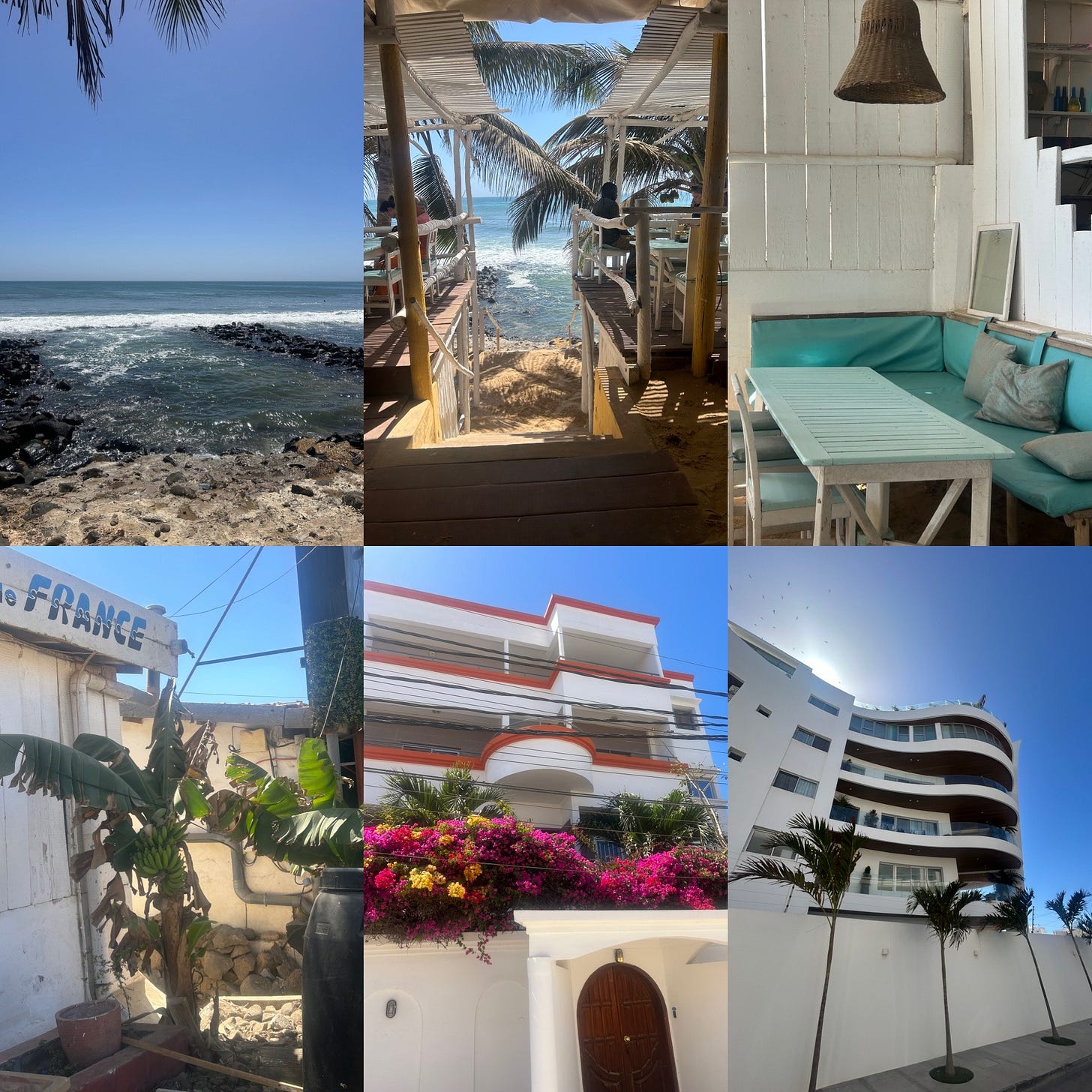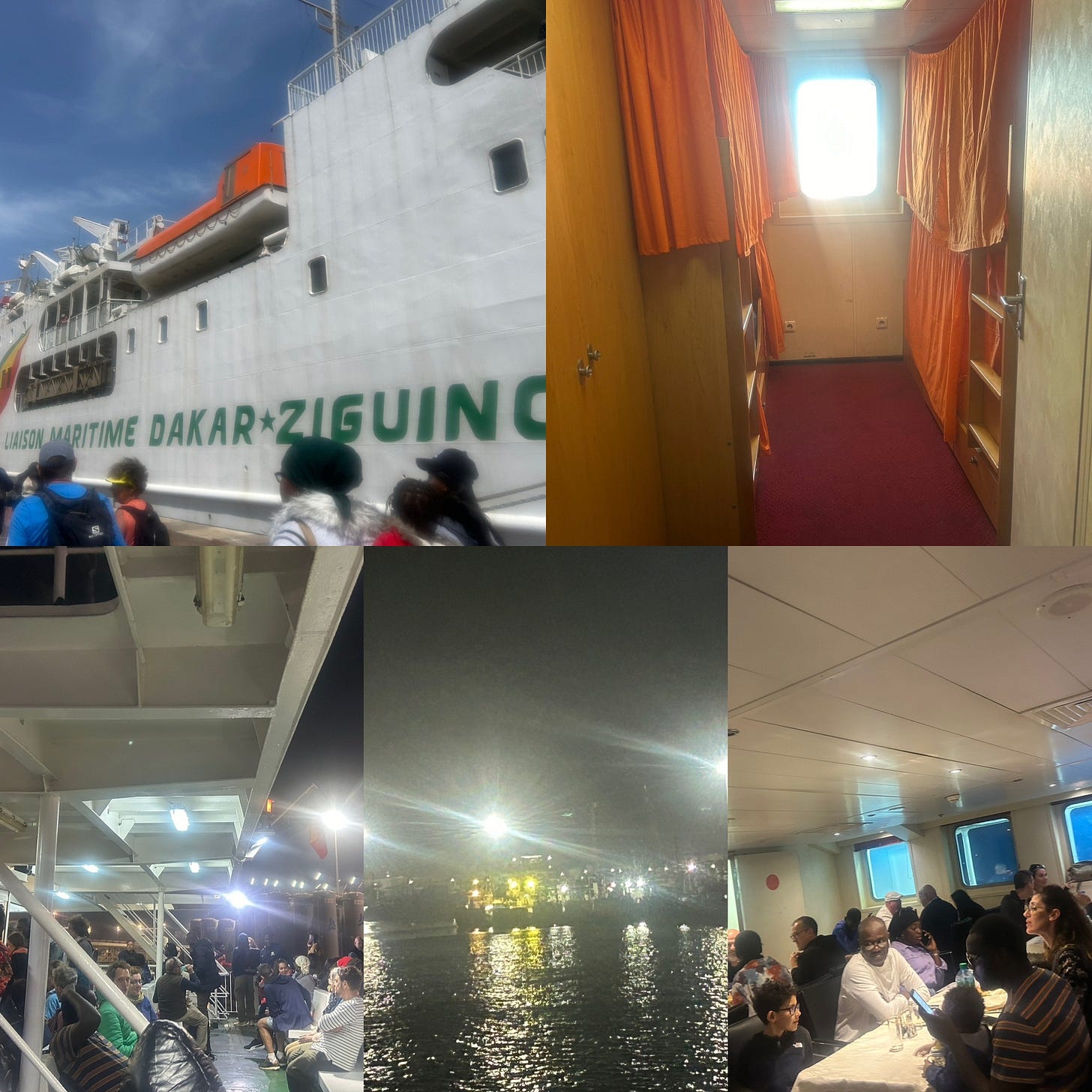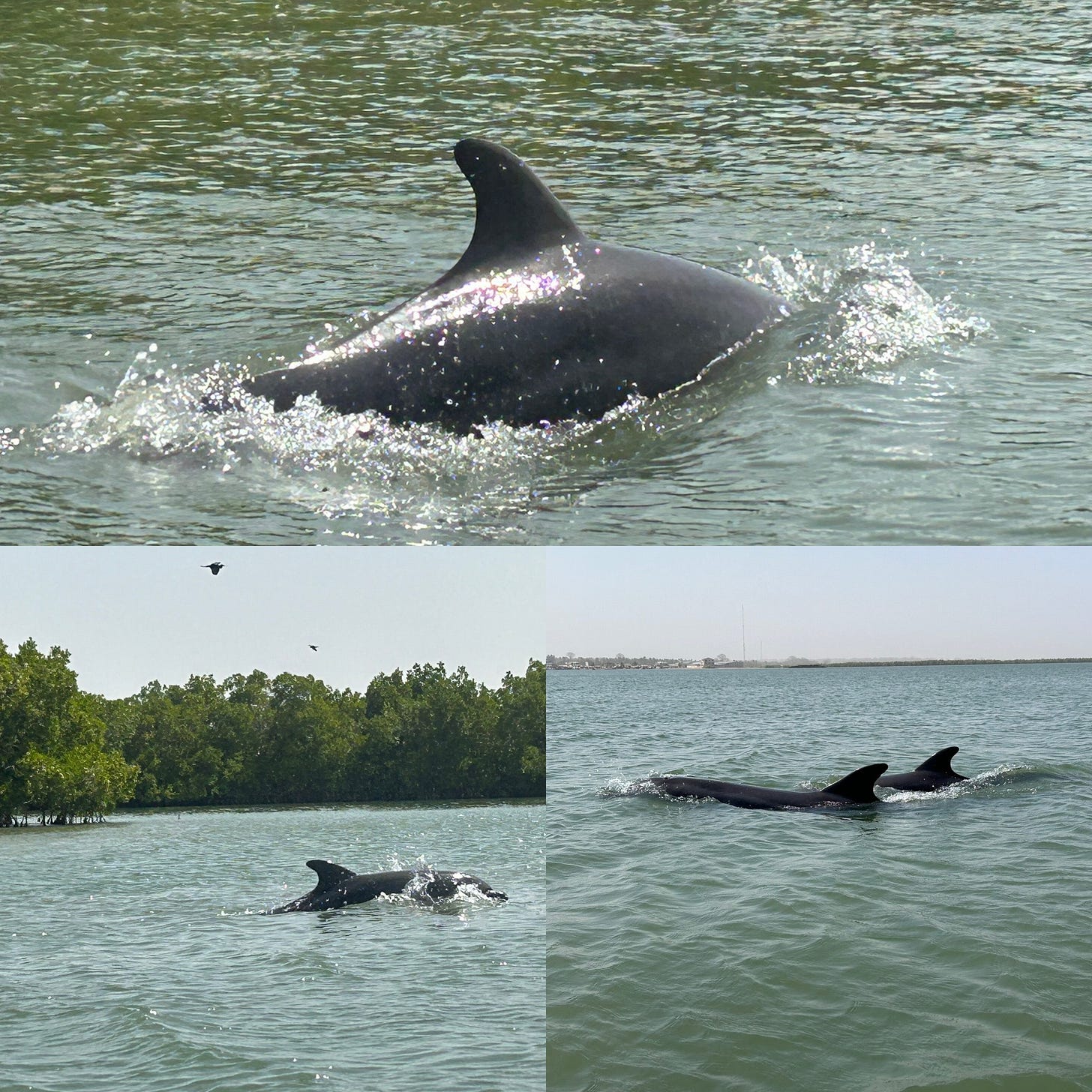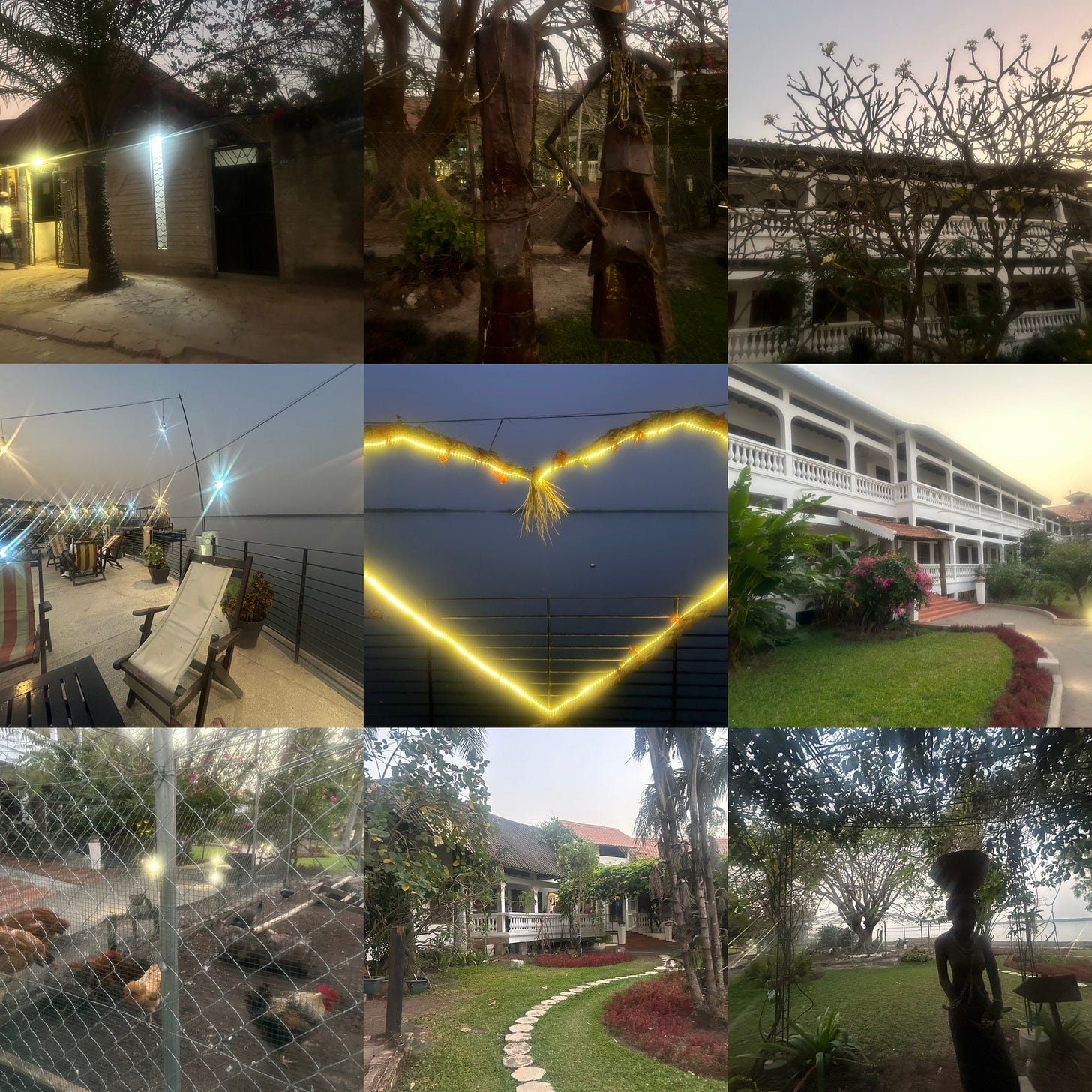Ferry Fun & The Beauty of Ziguinchor
Leaving Dakar for the Casamance region proves a beautiful journey
Feb. 21 - Dakar/Ferry to Ziguinchor
I wake to the call of prayer and the roosters. I have unfurled the mosquito netting even though there are few mosquitos and I have been taking my malaria pills since before I arrived. There is something cozy about being cocooned in the white netting, and I lie there for a while, just listening, to the sounds of Africa outside my window, lingering on my last morning in Dakar. My room has big windows facing the pool here at Le Lodge de Almadies, which is one of the reasons I chose it. But Dakar is quite cool, and the pool is unheated. I’d pushed through to swim, once, but it was not how I’d imagined it, hot and the water being a refreshing necessity. There is a lot I didn’t know about this place before I got here, a lot I imagined that wasn’t true, so much I couldn’t have imagined.
I pack up and leave my bags at the front desk before heading back to the oceanfront to meet the guys for one last lesson. I wave and offer a “Bonjour! C’est va?” to the man I bought the batik pants from, who’d insisted on sitting me down and making me tea on his little propane stove. I get warm smiles from the guys, who are already there, and coffee from Mamadou. When I try to pay, he waves me off. I tell Alpha, through Google Translate, that I will be back to fly out from Dakar after my trip to the Casamance region, and have a couple of days yet unplanned, but am not sure if I will see them again. I pay for the lessons, not terribly much. It is strange to figure how much to offer, but I throw out a number and Alpha asks for a bit more and it feels more than fair so we agree. Monetary exchange here, as an American, is a strange dance. That over, we embrace like old friends and I walk away, sadly, to grab a bite before heading back to my hotel for my stuff. I am planning to get to the ferry early, as I’m not sure what the process will entail and I am on my own, without Magueye’s guidance.
I find a beautiful little crepe place at the ocean and sit staring out at the sea, feeling into the familiarity of this foreign spot even after just a few days, how quickly I have been made to feel accepted and at home (even while understanding that the lure of my American dollars helps pave that path.) I see the young Mohammed selling bright fabric bags. He speaks a bit of English and I had said I’d buy one before I left, and it will come in handy now to carry all my purchases. On my way back to the hotel, I take in the beautiful apartment buildings that dot the landscape here, wondering at how it might look when next I visit, scared as I am in places around the U.S. with the changes that progress brings.
I say “Au revoir!” at my hotel, and think maybe to come back at the end of my trip, it has been so lovely. I ask for help getting a taxi, not that there aren’t 1,000 that pass by every minute, but help negotiating in the local language gives me confidence that I will get where I’m going.
I am glad I’d been to the ferry station before and know where to go. I show my passport a number of times, go through security, and wait for a while. People watching is interesting here and without being able to communicate, I have only to wonder about things I wish I could ask…Are the men wearing bright-patterned outfits and loads of wooden necklaces Rastafarians, I wonder, and what are their customs here? When I see white people they are usually French, and partnered with a Senegalese person. I take in these families and wonder if they met here, or in France, where they live. None of this is any of my business but normally I might strike up a conversation and get some answers, but not in this case. I hear zero English.
Once on the ferry, I am directed to my four-person cabin with its own bathroom with a flushing toilet, running sink and shower but no toilet paper, and no towels. I always travel with a light Turkish towel but I have forgotten it this time and have been sorry on many occasions. I am cheered to discover that there are four sizeable closets, and that all of my things fit securely inside. I snag a bottom bunk I vow to travel with only a backpack next time and I laugh to think how many times I’ve said this. I find the deck, and there is a bar there, and great African music playing. We sit a while before setting off toward Ziguinchor, and I stand at the ship’s railing watching the lights of Dakar fade into the distance.
I go to the restaurant for dinner and it is brusquely pointed out to me where I should sit in the crowded dining room, at a table with a family and few single people. The young son speaks a little English, the father tells me, and encourages the boy to speak with me, which he does a little. They share their water with me (I was unclear whether the bottle came free or not,) and then tried to ask for me where my food was when I, wordlessly, laughingly, shrugged in wonder of where it might be. The food, once it finally came, was surprisingly good, but the staff was, sadly, the least friendly faces I’d seen in Senegal. I supposed it was because they were dealing with so many people at once wanting to be served, so I tried to be understanding.
I greet my fellow cabin-mates with a ‘bonjour’ and crawl into my little bed. There is a blanket at the foot of it, and I pull my curtain closed and let the waves lull me to sleep.
FEB. 22 - Ferry/Ziguinchor— I wake to see the sunrise. I go out to the deck and it is filled with people, some who’ve slept there overnight, many lying with blankets like the one on my bed they might have been given or rented, not having purchased a place in a cabin, and some with young children, just up and out of their cabins like me.
There is music playing and the sun is there, emerging in the distance. I go to the dining room for breakfast and am placed with strangers who I smile and offer my weak “Bonjour.” Service is terrible, again. But I find that the coffee and bread and butter is free with my cabin, so I feel less annoyed:)
Before too long, we stop, at another port, and then, finally we are at Ziguinchor, a little late. I have read about my hotel, Le Perroquet, a small inexpensive hotel overlooking the Casamance River. I have determined that it is a short walk from the ferry station, but I have no idea what to expect.
As I disembark, I see crowds of people milling about, and I get asked if I want a taxi by a gajillion men. Children crowd around with hands out for money. I repeat myself over and over again as I wheel my suitcase and carry my new African beach bag full of art along the road.
“No. Merci. No. Merci.” I look straight ahead, make no eye contact. There is not really a sidewalk but it is only a few moments before I come upon the hotel, walled with a gate manned by a security guard.
As I walk into the beautiful courtyard, open to a little beach and the river beyond, I gather that there is a wide divide here between the tourists and the locals.
My room is lovely. I am welcomed with the luxury of towels, toilet paper and a new bar of soap on my bed. There is a heavy metal door and a screen door, both with heavy locks, that open to a little deck overlooking the beach and the fishing boats on the water. There are herons regally posing everywhere. I adore herons. My heart soars to be in this place. I note that it feels so much hotter, and look to find that it is 99 degrees versus the mid-70s during the day in Dakar. This is more what I had been expecting.
I take some time in my room, to write up the trip so far. There is a perfect little desk and the breeze comes in from my open door. I feel like Hunter S. Thompson, writing the Rum Diaries in Puerto Rico, and I think I could stay here for a long while, happily, in this little beautiful compound on the river.
When I go down for dinner, and stand at the chalkboard menu, ordering the Plate du jour that costs the equivalent of about $5, I am further convinced that this is a place I could happily reside. When it is delicious, and I sit there, watching the sun set and the birds fly all around, I am sure. I laugh at the cat’s aggressive begging. Animals clearly pick up on the culture of a place.
I meet a smiley local man sitting with friends at the hotel who seems to know everyone. When he asks if I’d like him to show me around, I hesitate for a second and then agree. I know I will not leave the compound alone, especially at night. We traverse the dirt roads to a little corner bar, Abdou fist-bumping friends along the way he introduces me to in his limited English as his “bros.” Some words exist globally it seems, like ‘bro.’
We stay there until it is late enough to go to No Panik! the nightclub where he works, which doesn’t get started until the wee hours apparently. Around 1:30 am it is still relatively empty. The songs played by the DJ Abdou introduces me to excitedly —“AMERICAIN!— shift back and forth between American favorites and African hits, and we dance in the VIP area (although few other people in the place are dancing.) When I tell Abdou I must leave around 3 am or so, the place is just beginning to come alive.
FEB. 23, Ziguinchor
In the morning, Abdou, my self-appointed “bodyguard,” joins me for coffee. Through his friendliness (and ability to speak the local language,) I meet people, like a woman I’d seen on the ferry with her son who now reveals herself to speak English, and smiles broadly, telling me how her father lives there in Ziguinchor, showing me pictures of his house there.
I suggest, looking out at the river, that I’d like to go out on a boat and even though Abdou understands little English, he nods in understanding and smiles broadly.
“Billy has a boat! I’ll call Billy!”
In moments, a man (Ousmane, not Billy) appears on the beach in front of us and I am all set to join a family going out on a boat trip out on the river to see birds and dolphins and cruise amidst the mangroves. The husband is English, the wife French and they have just moved from England to France. Their three young boys remind me of my own now-grown boys and their enthusiasm, which made traveling even more joyous.
It is an amazing trip and the ability for the couple to translate some of what Ousmane, our driver, says is super helpful.
Seeing the rustic lean-tos fisherman sleep in during the day and leave from to go fishing at night was fascinating, a view onto a completely different world, a beautiful one. It is so incredibly peaceful out on this river despite the hum of the boat’s engine. The birds are everywhere, herons, flamingos, even a bald eagle. The mangrove roots are filled with oysters.
On the last leg of our journey, the dolphins followed along, appearing suddenly on one side of the boat then another. The kids displayed the enthusiasm we all felt at seeing these magical creatures again and again, singly and in pairs.
I spend much of the afternoon feeling slightly unwell with intermittent stomach pains I pray won’t turn into something more. In the early evening I take a walk down the road to another hotel, Kadiandoumagne, whose grounds are supposed to be beautiful and am not disappointed. The flora and fauna, the sculptures and the caged birds are beautiful.
Hearts are a theme here, often accompanied by the words I Love You, which strikes me as funny, another something you couldn’t predict African culture would adopt from America. This is why travel is key!! Love is a global theme, and I feel it here. It is more than a word. But what can we do to merge practices for the benefit of all? Art and music are the love languages that extend beyond borders, of this I’m sure.
I go to bed early, excited for the next leg of my journey. I will be picked up in the morning by The Kora Workshop’s driver for what I’m told will be a bumpy two+ hour drive to Kafountine, to learn the kora!
Thanks for continuing to tune in to my journey. Being home in New York City now, writing in a Rockefeller Center cafe after a dentist appointment, it is slow-going to leak out the beautiful memories of my days in Senegal. But I want so much to share the beauty of the culture there in West Africa, even as the visceral feelings sadly fade. Please consider a paid subscription, and share with friends to help support my endeavors!! Sharing stories about music and culture across the globe is crucial, understanding of others something we sometimes fail to do, to all of our detriment!!!
In peace + harmony,
Steph











